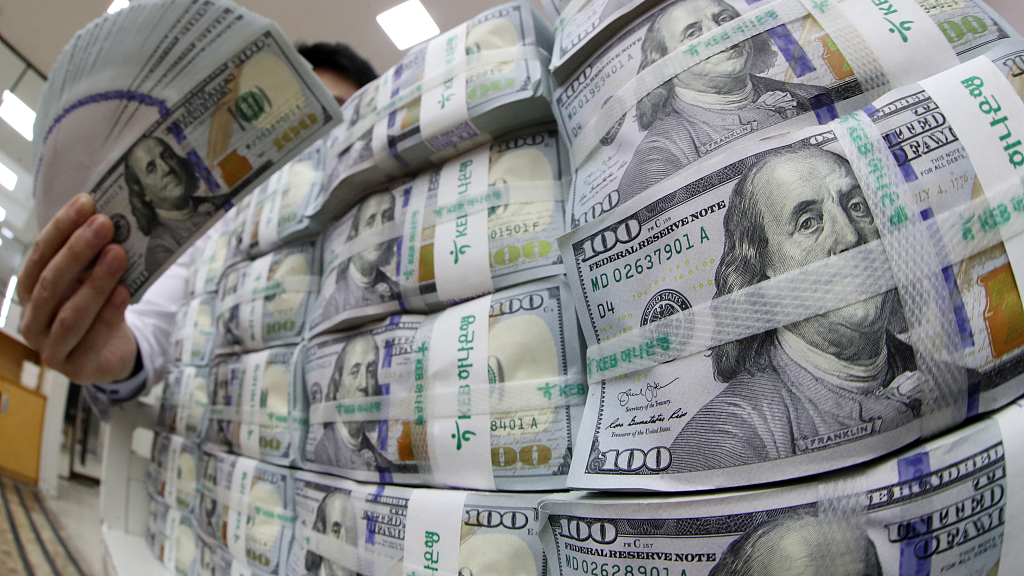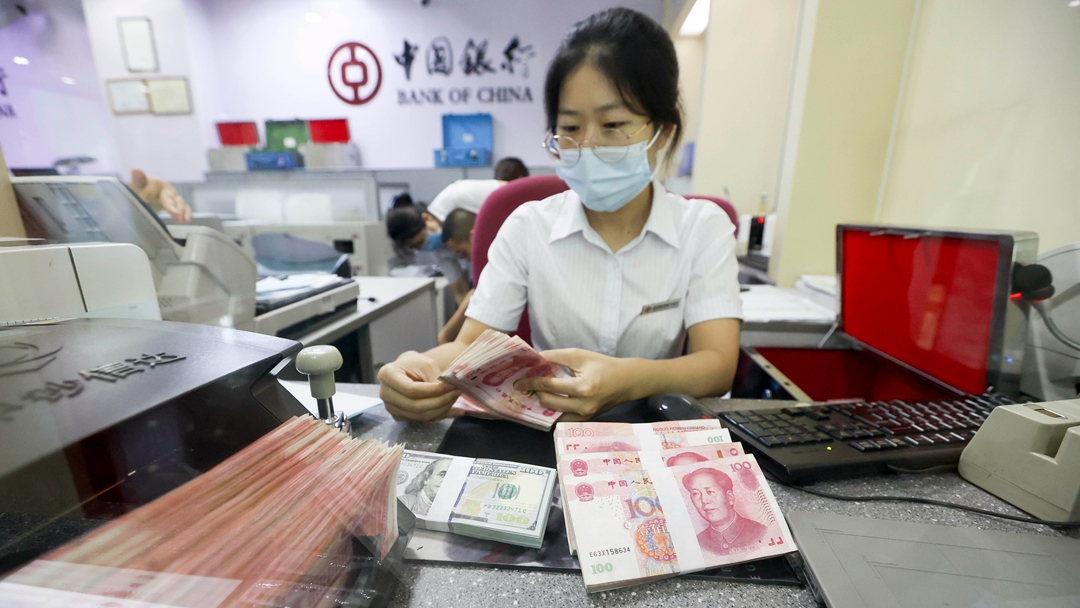
A bank employee organizes $100 bills at the counterfeiting response center of the main branch of Hana Bank in Jung-gu, Seoul, South Korea, March 18, 2020. /CFP
A bank employee organizes $100 bills at the counterfeiting response center of the main branch of Hana Bank in Jung-gu, Seoul, South Korea, March 18, 2020. /CFP
Editor's note: Matteo Giovannini is a finance professional at the Industrial and Commercial Bank of China in Beijing and a member of the China Task Force at the Italian Ministry of Economic Development. The article reflects the author's opinions and not necessarily the views of CGTN.
The Bretton Woods Conference, held in 1944 in New Hampshire, the U.S., is recognized as one of the most significant events in the world financial history. It not only established key global institutions but also created an international currency exchange regime based on U.S. dollar and gold.
For nearly 80 years the United States' legal tender has been the most widely used currency in international transactions as well the world's primary reserve currency held by governments and central banks worldwide for use in global trade.
However, a new trend is now emerging in cross-border financial channels in the Asia-Pacific, the world's most dynamic region, with governments and businesses actively promoting currency pairs and payment linkages for the execution of bilateral trade and investment transactions.
At the core of this course are not only pure geopolitical reasons but also a combination of economic and technological factors that in the long run are set to lead the transition to a new multipolar world order characterized by the presence of multiple currencies.
At the end of March, China and Brazil announced during the Brazil-China Economic Seminar in Beijing the signing of an agreement on trade in mutual currencies. The deal enables the two BRICS members to conduct their massive trade and financial transactions directly, exchanging Chinese yuan for Brazilian Real and vice versa, instead of using the U.S. dollar for settlements.
On April 1, India and Malaysia agreed to settle bilateral trade payments in the Indian rupees shifting away from the U.S. dollar, as announced by the New Delhi government. The new mechanism, that allows Indian and Malaysian traders to invoice their trade in Indian rupee is set to achieve better pricing for goods and services while leading to savings on currency conversion spread.
On April 4, it was highly reported on media outlets worldwide that China's yuan has replaced the U.S. dollar as the most traded currency in Russia, according to data compiled by Bloomberg and based on daily transaction reports from the Moscow Exchange. The overtaking of the yuan against the dollar happened in February for the first time and the difference in monthly trading volume became more pronounced in March.
That the de-dollarization trend goes beyond bilateral agreements is clear from the news that the BRICS countries (Brazil, Russia, India, China, and South Africa) are reportedly working on developing a new form of currency and a formal announcement is set to be made at the upcoming summit in South Africa. The magnitude of this move is more evident considering that Algeria, Argentina, and Iran have recently applied to join BRICS and that Afghanistan, Egypt, Indonesia, Saudi Arabia, and Turkey are also interested in becoming future members.

A Bank of China staff member counts currencies in Taiyuan, Shanxi Province, China, August 6, 2020. /CFP
A Bank of China staff member counts currencies in Taiyuan, Shanxi Province, China, August 6, 2020. /CFP
There are a few but very clear reasons why a de-dollarization trend is emerging at this moment in history.
Firstly, the U.S. dollar has passed from being a dominant and efficient medium of payments and investments into a tool used for blackmail and to align the dynamics of the global financial systems to the interests of a single nation. The fact that the U.S. can arbitrarily impose sanctions by leveraging its currency dominance on global markets represents a market distortion for which other nations are preparing by taking precautions to avoid the risk of being dragged into similar sanctions.
Secondly, sanctions imposed on Russia, including cutting off the linkage between the SWIFT system and Russian financial institutions, has demonstrated how the U.S. is not shy in using the dollar as a tool for geopolitical leverage. In this sense, the international community is simply protecting its own interests by pursuing a reduction in the exposure to the dollar and by promoting the creation of an alternative financial ecosystem that is fairer and that doesn't produce the same negative effects of the current one.
Lastly, the accelerated de-dollarization trend is demonstrated by a quasi-coordinated decision of central banks around the world to reduce holdings of U.S. dollar-denominated debt in order to diversify foreign exchange reserves. The resulting outcome is that, according to IMF data, the U.S. dollar's weight in foreign exchange reserves has drastically fallen to an historic low of around 60 percent.
It is fair to say that it is no easy feat to replace in the short-to-medium term the preponderance and the level of trust enjoyed by the greenback on international capital markets. Nonetheless, things can change fast when a trend starts to gain momentum.
As the problems with the U.S. dollar continue to mount it is easy to predict that the currency will continue to lose its shine and it is safe to expect that emerging countries will continue to distance themselves from a U.S.-led global financial system and join a viable alternative which is based on multipolarity and where no single currency holds an exorbitant privilege.
The introduction of Central Bank Digital Currency, online payment platforms, swap lines between China and other countries, and financial messaging services alternative to SWIFT, will help to accelerate the transition to a new global monetary and geopolitical order where Asia, and China in particular, is going to play a crucial role.
(If you want to contribute and have specific expertise, please contact us at opinions@cgtn.com. Follow @thouse_opinions on Twitter to discover the latest commentaries in the CGTN Opinion Section.)